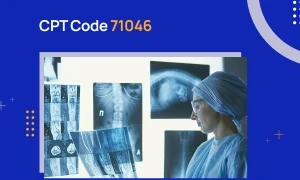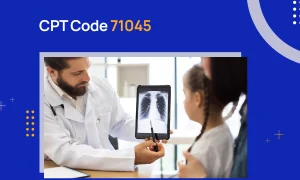Every healthcare provider and medical biller knows how challenging insurance claim denials can be. Each denied claim creates huge administrative burdens that can strain resources. Do you know that hospitals lose almost 5% of their net patient revenue annually because of denied claims?
Among thousands of denial codes, the CO 236 denial code is particularly frustrating. That is because it stems from coding complexities rather than patient care or coverage problems. But what exactly is it? And how can you prevent and resolve CO 236 denials? Well, that is what we are going to discuss in this guide. So, let’s start.
CO 236 Denial Code Description
The CO 236 denial code indicates: “This procedure or procedure/modifier combination is incompatible with another procedure or procedure/modifier combination provided on the same day according to the National Correct Coding Initiative or workers’ compensation state regulations/fee schedule requirements.”
Feeling confused? Let’s try to break this down in simpler terms.
The “CO” prefix stands for “Contractual Obligation,” meaning the denial occurred due to a breach of contract terms. In this case, the contract refers to the agreement that the healthcare provider and insurance payer sign upon in-network enrollment. This agreement outlines the physician fee schedule, billing and reimbursement guidelines, and payer policies.
Healthcare providers deny a claim with the CO 236 denial code in light of the National Correct Coding Initiative (NCCI).
When a healthcare provider receives this denial code, it means that, according to the NCCI or specific state regulations, the combination of procedures or modifiers billed together on the same date of service is inappropriate. This usually happens when:
- One service is already included in another service (bundling)
- The procedures are mutually exclusive and rarely performed together
- The biller forgot to add modifiers in the claim or used the wrong modifiers
What Causes the CO 236 Denial Code?
Understanding the root cause behind the denial code CO 236 is essential to avoid it. While this denial is triggered due to multiple factors, the following are the most common reasons:
NCCI Edits Violation/ Non-Compliance with Regulations
The Medicare NCCI maintains a list of procedure code pairs that should not be reported together in most circumstances. These are called Procedure-to-Procedure (PTP) edits. Each edit has a Column One and Column Two code. When you report both codes together, the Column One code is eligible for payment, but the Column Two code is denied unless an appropriate modifier is used.
The following modifier indicators can be used depending on the circumstances:
| Modifier Indicator | Description |
|---|---|
| 0 | No modifiers are allowed to bypass the edit |
| 1 | Appropriate modifiers may be used to bypass the edit under certain circumstances |
| 9 | The edit has been deleted or does not apply |
You can check your services for NCCI edits with the lookup tool provided by Medicare.
Apart from the NCCI edits, every state has regulations, like the specific workers’ compensation regulation or fee schedules for separately billable services. If you violate these rules, your claim might be rejected.
Unbundling
Unbundling is the most common cause of the CO 236 denial code. This happens when healthcare providers try to split services into separate codes when a single comprehensive code should be used. In this case, the insurance payer might reject a claim with a denial code 236. Unbundling as a mistake is easily resolvable. However, frequent and deliberate unbundling is a crime and may lead to heavy penalties and lawsuits.
Unusual Combination of Services
Insurance payers may deny claims with the CO 236 denial code when procedures rarely performed together on the same day are billed simultaneously. From the payer’s perspective, these combinations might appear clinically inappropriate or unnecessary, triggering the denial.
Incomplete Documentation
Another reason for the CO 236 denial is incomplete documentation. Even with correct coding, inadequate documentation can lead to the CO 236 denial. Insurance payers require proper documentation that justifies code/modifier usage and supports the medical necessity of performing multiple procedures on the same day.
Using the Wrong Modifiers
Modifiers are among the most important parts of an insurance claim. They provide additional information about a service or procedure and the circumstances in which it was performed. Sometimes, NCCI-associated modifiers like 59, XE, XS, XP, and XU can bypass NCCI PTP edits when clinically appropriate.
These modifiers help insurance companies identify separate, non-overlapping, or distinct services. Many practices face the CO 236 denial code because they either append modifiers to incorrect procedure codes or don’t use them when needed.
How to Prevent CO 236 Denial Code?
Preventing CO 236 denials is more efficient and cost-effective than resolving them after they occur. But how can you mitigate them? The following are some tips and guidelines that you can follow to avoid the CO 236 denial code.
Understand NCCI PTP Edits
Take time to thoroughly understand the NCCI PTP edits that apply to your specialty. CMS provides quarterly updates to these edits, so staying updated is essential. However, you don’t have to remember every coding pair. Simply use the NCCI PTP lookup tool before filing the claim.
Maintain Proper Documentation
As we discussed above, documentation is key to successful claim processing. Comprehensive documentation is your best defense against the CO 236 denial code. Attach the following records with every claim:
- Clinical justification for separate procedures
- The distinct and separate nature of procedures performed on the same day
- Different sites, organs, or structures when relevant
- Different sessions or encounters, if applicable
- Different diagnoses when they support separate procedures
Train Billing & Coding Staff
No software can reduce denials if your billing and coding staff are not trained on the latest standards and billing guidelines. Help your billing and coding staff get the necessary training and professional certifications.
Use Scrubbing Software & Perform Regular Audits
A good way to catch errors is to use claim-scrubbing software. These automated tools can catch potential coding incompatibilities before submission. This can significantly reduce the occurrence of CO 236 denials.
How to Resolve Denial Code 236?
Despite best prevention efforts, CO 236 denials may still occur. By using the following systematic approach, you can potentially resolve the CO 236 denial code:
- Check Remittance Advice: Review remittance advice to confirm the CO 236 denial reason. Note if there are any incompatible code combinations.
- Review Procedure Codes: Check denied claims for unbundled or mutually exclusive services using the NCCI PTP Lookup tool or CMS guidelines.
- Identify Missing Modifiers: Assess if the NCCI-associated modifier applies (e.g., different sessions/body parts). Please remember that you can only use modifiers in your claim when the modifier indicator is “1”.
- Check Supporting Documents: Ensure documentation supports medical necessity. Gather additional records (medical history, diagnoses, treatment plan, procedure notes) if needed.
- Take Actions & Resubmit: Once everything is corrected and all documents are attached, resubmit the claim electronically. Avoid manual claim submission to prevent any further complications
- Follow-up: Follow up with the payer every 15 days. If the claim remains unpaid, ask the insurance company for clarification. Also, if the dispute is due to medical necessity, request a peer-to-peer review or file a formal appeal.
Final Word
CO 236 denial code can be a huge hurdle in your revenue collection. However, the denials can be significantly reduced with proper attention to coding guidelines and a systematic approach to billing. On the contrary, dealing with the denial code CO 236 can be time-consuming.
If you are consistently struggling with CO 236 denials despite your best efforts, consider outsourcing denial management to us. Our billing experts at NeuraBill have decades of experience in denial management and resolving complex coding and billing issues.



